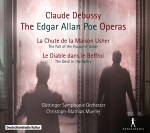|
Back
06/29/2016
Claude Debussy: La Chute de la maison Usher, L. 112 – Le Diable dans le beffroi, L. 101 (completed and orchestrated by R. Orledge)
William Dazeley (Roderick Usher), Eugene Villanueva (Roderick’s friend/Mayor), Virgil Hartinger (Doctor/Jean), Lin Lin Fan (Lady Madeline/Jeannette), Michael Dries (Bell ringer),
Göttinger Symphonie Orchester, Christop-Mathias Mueller (Conductor)
Recording: Stadthalle Göttingen, Germany (December 2013) – 88’42
Pan Classics # PC10342 – Liner notes in French, English and German

   
Most people equate Claude Debussy’s operatic acclaim with the lone sensation, Pelléas et Mélisande, yet his translucencies roamed deeper though in varying degrees ahead and behind his well-received 1902 drame lyrique. While his first opera, Rodrigue et Chimène is marked with uncertainties as an œuvre complète (1893), there’s no lack of questioning the rough outlines surrounding La Chute de la maison Usher and Le Diable dans le beffroi.
Debussy had every intention of completing these works before he died, especially since he’d promised The Metropolitan Opera the premiere of his two Edgar Allan Poe-based operas. It never came to fruition. The dichotomous double-bill would have been a perfect fit, a night presenting contrasting themes and tones and a perfect recipe for New York City patrons. This Pan Classics recording is historic by way of musicologist, Robert Orledge, as he gathers in design and outline Debussy’s intellections for the venerable Manhattan venue. Here we have Mr. Orledge’s immeasurable depth of knowledge and imagery incited by a colorful spark into a vaporous Debussy.
As narrator, Eugene Villanueva’s assuaging baritone voice assists in mollifying hyperesthetic Roderick Usher (William Dazeley) with convincing momentum, especially when set against the opening’s melancholic, unassured mystique braced by Debussy’s eerie four note motif. Mr. Orledge sets the scene beautifully. Pelléas et Mélisande is omnipresent, yet in La Chute the atonality is undeniably more sinister and creepy. Set against Poe’s 1839 Gothic short story, Robert Orledge bolts the mind with morbidity by electrifying Debussy’s gruesome oddities that continue to splendidly crescendo. Superbly suspenseful.
On the complete opposite end of the spectrum, we find the frivolous, bombastic forces at play within Le Diable dans le beffroi. The Orledge orchestration, cobbled together by Debussy sketches, is strangely more melodic than one would imagine. The Ravelian “Prélude” helps pave way for a magnificent piece: quirky, lyrical, folksy. The Dutch village of Vondervotteimittiss is preposterously hell-bent on keeping punctuality par les horloges while fastidiously tending to cabbages, further strengthening absurdities with comical textures that Debussy would likely approve. The Göttinger Children’s Choir ushers in Gounod-like Mireille provincial pleasantries while Viktor Ullmann’s Der zerbrochene Krug is a pervasive parallel model in music and storyline. Poe’s simplistic demonic powers are broadened by Robert Orledge when he places a Faustian spell (ref: Gounod’s Act II Faust) over the townspeople and adds an eccentric love interest (Jeannette and Jean.)
Deemed a conte musical, Debussy worked long and hard for four years on the musical idées that have been polished into a buffoonish mold similar to Ravel’s L’Heure espagnole. Percussion additives are extremely fashionable and devilishly amusing. Ironically on Track 13 the Devil begins to play the fiddle as he places a hex on the carillon with a cracked sound which Orledge cleverly and humorously elicits in assorted bars gleaned from Max Bruch’s Violin Concerto N° 1 [“Allegro energico’] amongst others. Furthermore, Mr. Orledge provides Lucifer with his own impish theme: just when the opera is expected to end, the belfry troublemaker reappears with a flittering ending that glances at Der Rosenkavalier, specifically that of little Mahomet. Terrific.
Lin Lin Fan sings the role of Jeanette with aplomb: her finely-tuned register gathers impeccable dexterity, possessive of empirical velveteen tonality and responsive flexibility. The timbre borders on a soft Sumi Jo while concluding selections unveil an episodic coloratura memento bringing to mind the marvelous richness of Barbara Hendricks...watch this young soprano as she is an up-and-coming star in the operatic world.
One can hope the investments made by Robert Orledge and the Göttinger Symphony Orchestra will reinstate Claude Debussy’s original intentions for The Metropolitan Opera in the foreseeable future. For the time being, however, savor the moment with this Pan Classics rendition. The recording deserves a gander or two.
Christie Grimstad
|